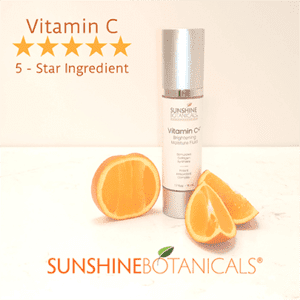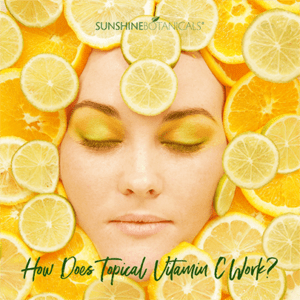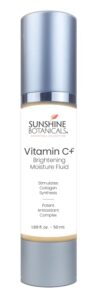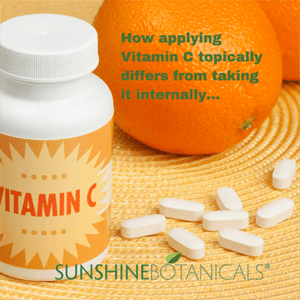
First, it is VERY important to understand not all vitamin C products are created equal. Those that contain very high concentrations can irritate the skin. On the flip side, you will not experience any value if the formula is weak and unstable. In addition, topical vitamin C can be problematic and may have contraindications if used with Retin-A because of the intense irritation that occurs when you use both ingredients together in a skincare routine. Making that choice is hard to do when you want the benefits of both the vitamin A in Retinol and the Vitamin C benefits. So what do you do? First, let’s look at what this ingredient is:
What is Topical Vitamin C?

How Does Topical Vitamin C Work?
Vitamin C—also known as ascorbic acid—is a water-soluble nutrient that plays an essential role in keeping your skin healthy. Topical vitamin C is clinically proven to have a wide range of clinical applications thanks to its antioxidant, anti-aging, anti-pigmentary properties. This potent nutrient offers many benefits for the skin, including the potential to:
- Stimulates Collagen Production – Fights Environmental Damage
- Helps Repair Damaged Skin and Cartlidge
- Diminish the Appearance of Fine Lines and Wrinkles
- Brightens Complexion
- Evens Skin Tone
- Reduce Discoloration i
- Prevents Premature Aging
Topical Vitamin C is shown to protect the skin from UV damage caused by prolonged sun exposure by reducing the amount of free radical formation and sunburn cells. Exposure to UV light has also been shown to decrease the naturally occurring vitamin C levels in the skin. Thus, the topical application of vitamin C restores these photo-protectant levels. Other studies also suggest that vitamin C may play a part in the collagen biosynthetic pathway by activating collagen metabolism and dermal synthesis of elastic fibers. Vitamin C is a water-soluble vitamin and mainly acts as an antioxidant. It scavenges free radicals, which cause oxidative stress to otherwise healthy skin cells. This stress leads to damaged skin cells, leading to collagen degradation and premature aging. Vitamin C does not rebuild collagen; rather, it fights against the elements that cause collagen damage and restore the systems that build collagen.
What is Sunshine Botanicals Approach to Formulating Vitamin C Products?

Q. Your Vitamin C+ Brightening Moisture Fluid shows your vitamin C is in the form of polypeptides. Can you please explain what polypeptide means as well as the form/delivery system of Vitamin C that is used in your serum in contrast to others on the market? How does ascorbic acid polypeptide differ from Ascorbyl palmitate? Since the production process is as important as the main ingredient to produce the finished formula, can you tell us a bit more about what all this means?
A. Sunshine Botanicals chooses their Vitamin C in the form of a polypeptide for a superior form for Vitamin C delivery. Other forms are less stable, oxidize quickly, and don’t penetrate the skin as effectively. A polypeptide is a type of chain produced by amino acid proteins. In this case, the protein is derived from citrus fruit which also carries Vitamin C. The protein form provides a more effective delivery of ascorbic acid. Liposomes are spherical vehicles composed of phospholipid and (in this case) vitamins. Like polypeptides, they are more effective in the delivery system compared to other forms of vitamins. They penetrate the skin more deeply, therefore, providing more effectiveness.
Q. Is it true that your concentration of Vitamin C is 2%? How does that compare to other Vitamin C products with a higher concentration? (I came across a product with a much higher percent of Vitamin C and wondered…)
A. It is time for some straight talk about the difference in “percentages” of vitamin C skin topical products and clears the marketing hype and confusion….
Vitamin C+ Brightening Moisture Serum percentage breaks down like this:
2% polypeptide of which the ascorbic acid (Vitamin C) content is 18 – 23%
1% liposome of which the ascorbic acid (Vitamin C) content is 20 %
We use the highest recommended percentages for use. The body can only metabolize a certain amount of vitamins. Anything more eliminates from the body, as waste. You can add ten times the recommended percentage, but if your body doesn’t use it…what’s the point?
Q: If you have sensitive, fragile, or Rosacea skin, Vitamin C products can be very irritating, and if you use Retin-A, Vitamin C products can be massively sensitizing and often completely contraindicated. Go easy if you want to use a vitamin C serum along with other acidic skincare products like retinol. Together they could irritate your skin. Consider using them on alternating days rather than at the same time. It sounds like this form of Vitamin C could be the answer for situations like this. Is that correct?
A. YES! The balanced pH of Vitamin C+ Brightening Moisture Fluid and the nature of the Vitamin C itself doesn’t produce the acidic “bite” that most Vitamin C topicals do – instead, the liposomes and polypeptides actually feel soothing on the skin. They can be safely included in a daily treatment routine that includes retinol and those with sensitive skin—also an excellent treatment for oncology patients and compromised skin conditions.

A. When you use topical vitamin C with this type of delivery system, it is metabolized differently and more quickly through the skin. Please understand – the topical application of vitamin c AND the daily intake of at least 2000 mg. daily of liposomal vitamin C is ideal for the skin to address the need for antioxidant support and collagen-building – from this inside–out!
I hope this information helps you find your solution, and I can’t wait to show you more! Follow us on FB and sign up for our newsletter.
My passion Is Your Solution,
![]()
Sources:
NCBI.gov
Derm Net NZ
Linus Pauling Institute
